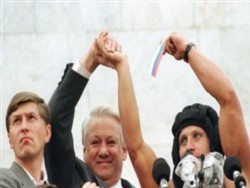
The failure of the August 1991 coup, the 25th anniversary of which is celebrated these days, has created unique opportunities for quick and relatively painless dissolution of the USSR “the greatest geopolitical catastrophe of the twentieth century,” as he called it, Vladimir Putin not only did not cause significant resistance, but passed almost unnoticed.
The preservation of the Soviet Union, under the slogan which was made by the leaders of the putsch, has been so discredited that after the failure of his coup, it was impossible to discuss seriously. The institutions supported in the eyes of the crumbling construction of the Union state, were either abolished (as the Communist party), or under the control of the authorities of Russia and other Soviet republics. Attempts to preserve a single state, undertaken by Mikhail Gorbachev after the August 1991, were doomed to failure: President of the Soviet Union dramatically lost influence, giving temporary leadership of the coalition of the heads of republics, led by Yeltsin, and the subsequent shortly official registration of the dissolution of the Soviet Union in the Belavezha accords only completed the liquidation process, launched during the failed coup.
This development was far from the worst compared to other options that were facing the Soviet Union in August 1991. There is no need to prove that a possible victory of the emergency Committee could bring great trouble. In this case, in addition to the repression of the nascent anti-Communist opposition, the country could expect an attempt to suppress the power relied on the mass support of national movements and related new elites in the Baltic States, Georgia, Armenia and Moldova.
This suppression inevitably would result in considerable blood inside the country and abroad plunged the Soviet Union into a new international isolation, much more serious than in the worst years of the cold war. But most importantly – the coup were not in stock any realistic plans for running the country, except one: “return everything as it was before.” About any reforms in the economy, and even the speech went. If the coup had managed to come to power, the pre-coup months, the deep crisis of the Soviet economy most likely would evolve into a full-scale collapse.
Imagine further consequences of the revenge of the reactionaries, caught in the user suffering an economic collapse and affected by serious domestic and foreign conflicts, nuclear power – the challenge for fans of “alternative history”. But it’s safe to say that the many troubles that hit in 1990-e years, decaying almost simultaneously with the Soviet Union, Yugoslavia, would have seemed no more than a children’s tale.
But if the coup failed to agree among themselves or they’d be afraid to speak out against Gorbachev, and in this case, the fate of the USSR would have been more than doubtful. In fact, a conspiracy instigated the putsch was prepared in August 1991, the signing of a new Union Treaty, which was a compromise between Gorbachev and the leaders of 9 of the 15 Soviet republics.
This project involved a radical decentralization of governance, and indeed, her transformation into a Confederate unit, where the Republic would have the right to veto some decisions of the Federal Centre and the tax system would be single-channel. Such unstable political Alliance, however, was not suitable for carrying out badly needed market reforms. Most likely, the new Soviet government (the Prime Minister planned appointment of Nursultan Nazarbayev) had to face great difficulties in developing and implementing agreed solutions rapidly in a situation exacerbated by the economic crisis.
The leaders of the republics, most likely, would not take responsibility for unpopular measures, the possibility of forcing the Federal authorities would be very limited, and the legitimacy of their action would put into question. Losing popularity to Gorbachev, who held the post of the head of state in a series of procedural manipulation, was opposed to the popularly elected parliaments and heads of republics, which enjoyed considerable mass support, and to appeal to it as an argument in the course of the struggle. In these conditions the slogans of sovereignty of the republics (both allied and Autonomous) soon sounded with new strength.
Although the signing of a new Union Treaty could delay the collapse of the Soviet Union, but in itself it is not able to solve the problems it created. The difference was that instead of an instantaneous breakup of the Union republics (which occurred after the failure of the coup) in this case, the Union would expect a much longer process of divorce, which almost inevitably are accompanied difficult section of the Union of “heritage”: from nuclear to natural resources.
Territorial claims at such developments could come to the fore, turning the tensions and risk of further ethno-political conflicts. And even if Gorbachev and leaders of the republics managed to avoid bloodshed, the chances of the new Soviet Union to withdraw from economic and political crises likely to have been minimal. In other words, the disintegration of the country would be only a matter of time and pending the agony of the USSR could be very painful.
It would seem that the failure of the coup has opened up new opportunities for the republics of the former Soviet Union, allowing them to advance towards greater political and economic freedom. But these possibilities in many of them either were small or were lost. And so the quarter of a century later many post-Soviet citizens tend to remember the events of August 1991, not as a missed opportunity for change, but as a tragic accident, not allowed to extend the “good old days” (which did not seem the “Golden age” in 1991, when the slogan of the day was the name of the popular movie “can’t live”). Such retrospective views about the mistakes of the past hurt to build a successful future. We have to admit: in August 1991, the Soviet Union was already doomed, and the failure of the coup was the least of possible evils – realistic alternatives to it could be either a horrible end or endless horror.






